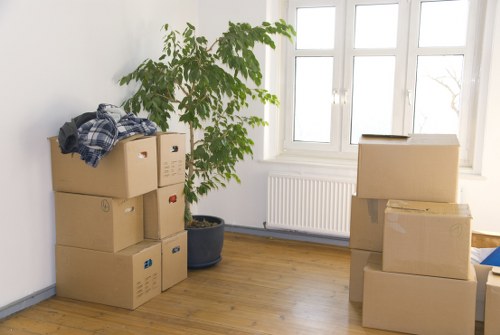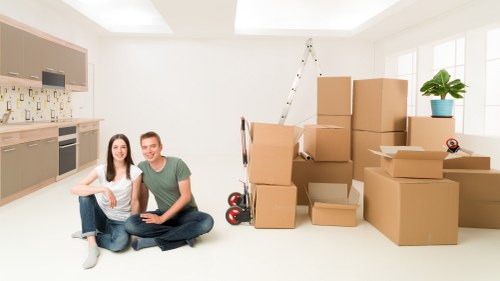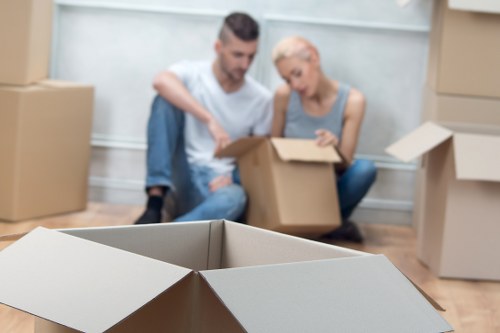Council Rubbish Collection in Addlestone: A Comprehensive Guide

Managing household waste is a crucial part of maintaining a clean and healthy environment. In Addlestone, the council offers a structured rubbish collection service to help residents dispose of their waste responsibly.
This guide provides detailed information about the council rubbish collection services in Addlestone, including schedules, types of waste accepted, preparation tips, and more.
Understanding the rubbish collection process can help you minimize waste, recycle effectively, and keep your neighborhood tidy.
Rubbish Collection Schedule

The council in Addlestone follows a specific schedule for rubbish collection to ensure efficiency and convenience for all residents.
Typically, rubbish is collected once a week, with recycling services provided on a separate day. It's important to adhere to these schedules to avoid missed collections or fines.
Residents can find their specific collection days by checking the council's website or contacting the local waste management office.
Types of Waste Accepted
Household Waste

Household waste includes everyday items like kitchen scraps, packaging, and non-recyclable materials. It's essential to separate this waste from recyclable and hazardous items.
Proper disposal of household waste helps reduce landfill use and promotes a cleaner environment.
Residents should ensure that all rubbish is securely bagged to prevent littering and maintain hygiene.
Recycling

Recycling is a key component of the council's waste management strategy. Materials such as paper, glass, plastics, and metals are collected separately for recycling.
Proper segregation of recyclables ensures that these materials are processed correctly and reused, conserving natural resources.
Residents are encouraged to rinse containers and remove any food residue before placing them in the recycling bins.
Garden Waste

Garden waste includes grass clippings, branches, and leaves. The council provides specific bins for garden waste to facilitate its collection and processing.
Proper disposal of garden waste helps maintain green spaces and reduces the spread of pests and diseases.
Residents should ensure that garden waste is not contaminated with other types of rubbish to streamline the collection process.
Bulky Items

Bulky items such as furniture, appliances, and large electronics require special arrangements for disposal. The council offers scheduled collection services for these items.
Residents must book a collection slot in advance and ensure that items are placed outside on the designated pickup day.
Proper disposal of bulky items prevents them from becoming a nuisance in public spaces and supports recycling efforts.
How to Prepare Your Rubbish for Collection
Preparing your rubbish correctly ensures efficient collection and minimizes environmental impact.
Here are some key steps:
- Sort Your Waste: Separate recyclable materials from general waste.
- Use Appropriate Bins: Utilize the right bins for different types of waste.
- Secure Your Bags: Tie bags tightly to prevent spillage.
- Label Special Items: Clearly label bins for recycling, garden waste, and general rubbish.
By following these steps, residents can contribute to a more effective rubbish collection system.
Special Services and Considerations
The council offers additional services to address specific waste management needs.
These include:
- **Hazardous Waste Disposal:** Safe collection of toxic materials.
- **Electronic Waste Recycling:** Specialized handling of electronic items.
- **Compost Collection:** Services for organic waste recycling.
Residents are encouraged to utilize these services to ensure the safe and responsible disposal of specialized waste.
Fees and Registration
Most rubbish collection services are funded by the council, but certain services may incur additional fees.
Registration is typically required to access bulky item collections and specialized waste disposal services.
Residents can register through the council's official website or by contacting the local waste management office.
Environmental Impact and Recycling Efforts
The council's rubbish collection program plays a vital role in reducing environmental impact.
By promoting recycling and proper waste disposal, the council helps conserve natural resources and reduce landfill usage.
Residents' participation is crucial in achieving these environmental goals.
Challenges and Solutions in Rubbish Collection
Effective rubbish collection faces several challenges, including:
- **Inconsistent Participation:** Some residents may not adhere to collection guidelines.
- **Limited Recycling Facilities:** Constraints in processing recycled materials.
- **Waste Volume Management:** Handling increasing amounts of waste.
To address these challenges, the council implements educational campaigns, invests in recycling infrastructure, and promotes waste reduction strategies.
Nearby Areas and Their Services
Addlestone is surrounded by several areas, each benefiting from the council's rubbish collection services. Understanding the proximity and unique features of these areas can help residents access services efficiently.
- Chertsey: Located just 2 miles east, Chertsey offers comprehensive waste collection similar to Addlestone, with additional community recycling centers.
- Ottershaw: 3 miles north, Ottershaw residents enjoy scheduled bulky item collections every two months.
- Thorpe: Situated 4 miles west, Thorpe has a dedicated garden waste collection day each month.
- Byfleet: 5 miles northeast, Byfleet provides electronic waste drop-off points in addition to regular collections.
- Virginia Water: 6 miles south, Virginia Water emphasizes eco-friendly disposal methods and composting services.
- Shepperton: 7 miles southeast, Shepperton has enhanced recycling facilities for metals and plastics.
- East Molesey: 8 miles southwest, East Molesey offers hazardous waste collection events quarterly.
- Old Byfleet 9 miles northwest, Old Byfleet supports community-led waste reduction initiatives.
- West Byfleet: 10 miles northeast, West Byfleet features multiple recycling drop-off centers.
- New Haw: 11 miles south, New Haw participates in the council's composting program.
Frequently Asked Questions
1. How do I find my rubbish collection day in Addlestone?
You can find your specific collection day by visiting the council's official website or contacting the local waste management office. Enter your postcode for accurate information.
2. What items are not accepted in regular rubbish collection?
Items such as hazardous waste, electronics, and large bulky items are not accepted in regular rubbish collection. These require special disposal arrangements.
3. Are there any fees for bulky item collection?
Yes, there may be additional fees for bulky item collections. It's best to check the council's website or contact them directly for detailed information.
4. How can I reduce my household waste effectively?
Practice recycling, compost organic waste, and minimize single-use items. Proper sorting and using appropriate bins also contribute to waste reduction.
5. What should I do with hazardous waste in Addlestone?
Hazardous waste should be taken to designated collection points or during special collection events organized by the council. Do not dispose of them in regular bins.